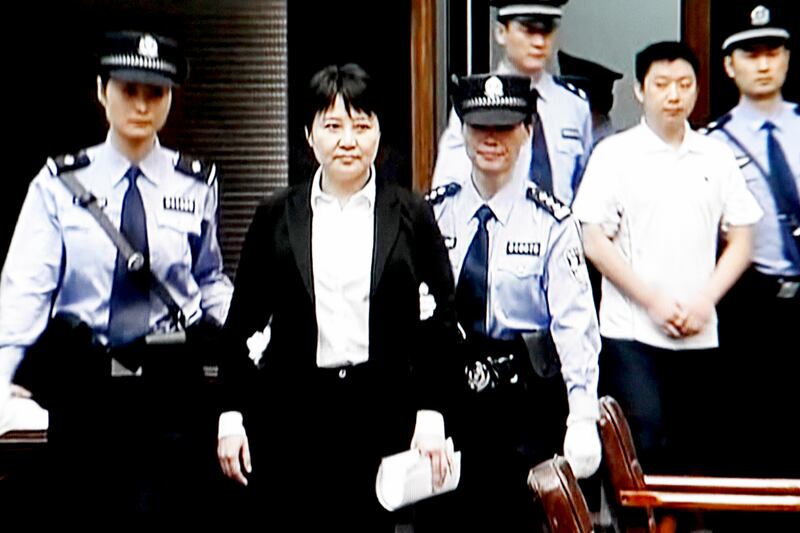After a Chinese court gave Gu Kailai, the glamorous wife of a disgraced Politburo member, a suspended death sentence in the murder of a British businessman, Chinese Internet users vented their anger at the pampered treatment of China’s privileged elite on Monday. Following the sentencing, more than a million posts on the sentencing of Gu appeared on Sina Weibo, the Chinese micro-blogging service, which is tantamount to Twitter. (Twitter itself is blocked by the Chinese firewall.)
Many Chinese Internet users criticized the death sentence, which was suspended for two years, as too lenient. "Bigwig gets death sentence with reprieve for murder, common people get immediate execution,” lamented one Weibo user.
In the vast majority of such legal cases, the suspended death sentence is automatically commuted to life if the defendant exhibits good behavior for two years after a guilty verdict. People serving life sentences are also eligible for medical parole after just seven years. According to the Dui Hua Foundation, a U.S.-based nonprofit, which engages in humanitarian works on behalf of Chinese detainees, that means Gu could go free in as little as nine years.
Thus far, all signs point to a short sentence. Today, state media reported that Gu had suffered “chronic insomnia, anxiety and depression, and paranoia in the past” with physical and psychological dependence on “sedative hypnotic drugs, which resulted in mental disorders.” In previous cases, Chinese authorities have used mental disorders as the basis for medical parole, according to Dui Hua.
If Gu winds up serving only nine years, the sentence would seem rather short by comparison with other cases. In years past, it was not unknown for people in China to receive a seven-year prison stint for stealing a bicycle. In 2009, Chinese dissident and Nobel laureate Liu Xiaobo was sentenced to 11 years on charges of subversion, after sending what authorities considered to be anti-government emails.

Yet there is some precedent for the wives of prominent officials serving long prison sentences. In 1980, Chinese officials meted out a death sentence to Mao Zedong’s strident widow, Jiang Qing. She and her comrades were found guilty of, among other things, subversion, counter-revolutionary activity, persecuting 727,420 people, and causing the deaths of 34,274. In 1983, Jiang’s sentence was commuted to life in prison. She spent nearly the rest of her life behind bars, until she reportedly committed suicide in 1991.
Last week, Gu confessed to poisoning Neil Heywood, the British businessman, according to Chinese state media, after he demanded money from her in a business dispute, and had kidnapped her son, Bo Guagua, in an attempt to blackmail her.
Neither the trial nor the sentencing came as much of a shock in China, as both were widely viewed as highly scripted affairs. For months Chinese citizens had expected that Gu’s life would be spared because her husband, Bo Xilai, who was purged in March as the party boss in the city of Chongqing, still has friends in powerful places. “A deal was struck behind the scenes,” posited Carl Minzner, a professor at Fordham University Law School. “High-level cases like this have always been decided in accordance with political rather than legal considerations.”
Despite the lack of surprise over the verdict, the sentencing announcement provided an appropriate opening for many Chinese to air their resentment at the gilded lifestyles of the children of revolutionary veterans, known as “princelings.” (Gu is the daughter of a senior general, and Bo is the son of a famous Chinese vice-premier).
Many Chinese believe that Heywood’s murder only became public knowledge because Bo’s top police official, Wang Lijun, fell out of favor with Bo, and fearing for his life, sought temporary refuge in the U.S. consulate in Chengdu; he then spent more than 30 hours inside the consulate, telling startled U.S. diplomats about Heywood’s murder.
Equally damning, when four senior Chongqing policemen assigned to investigate the death realized Gu was the most likely killer, they helped her cover up the crime. And any mention of Bo was conspicuously absent during the court proceedings—a sure sign to many Chinese that the former Chongqing party boss may escape trial altogether, and instead face intra-party discipline. (Bo is currently under detention by the party's watchdog department.)
Even if Gu spends the next nine years behind bars, many critics will maintain that justice was not served because of her privileged family. "We can't really talk about the fairness of the trial," said Zhang Lifan, a former analyst with the Chinese Academy for Social Sciences. "This is, after all, a political issue."






